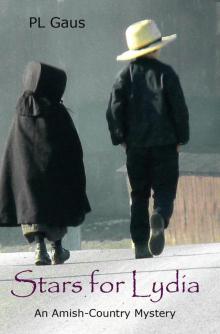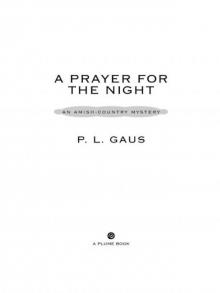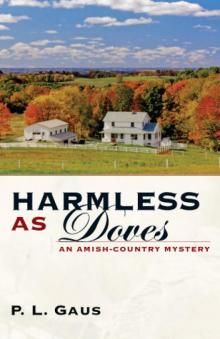- Home
- P. L. Gaus
Stars for Lydia Page 5
Stars for Lydia Read online
Page 5
Junior stood back to watch with silent curiosity. He smiled sardonically and said, “It’s just mud. Are they going to have to sit there all night? They have beds inside, you know. They’re going to have to walk there, and their feet will just get muddy again.”
The professor thought he heard a note of disdain in Junior’s voice. It was an assertive note that was no longer just simply sad and mournful.
Detective Lance, with her hair quite blonde and grown out considerably longer than usual, turned to Junior with a smile on her round Germanic face, and she said, “A social worker is coming out, Mr. Yost. She’s bringing a van. A small camper van. So, I just thought we’d clean them up for her.”
With mild antipathy, mixed with a bit of wariness in his tone, Junior said, “We don’t really need a social worker. The bishop is coming, and our grandparents live just across the road. We can take care of ourselves.”
Lance didn’t argue. Alice Shewmon would handle the assessment, once she had arrived. To Ricky, Lance said, “Any idea when you expect Alice?”
Ricky pointed down the long driveway, where a high-domed camper van was approaching. “She’s here now,” Ricky said. “She was supposed to bring a nurse, too.”
Stepping forward briskly, Junior spoke with greater intensity. “We don’t need a nurse here. We can take care of ourselves.”
Detectives Lance and Niell gave him voiceless stares. Junior backed away and stood apart from his brothers and sisters, brooding. Despite his affected self-assurance, he looked conflicted. Confused. Unsure. The professor tried to engage him, but Junior would have nothing to say.
Still back somewhat on the lane, Alice Shewmon parked her camper van, climbed down from the driver’s seat, and trudged forward in the mud. Once she had reached the gravel patch, she stopped and asked, “The father’s still inside?”
Ricky answered, “With Robertson and Carson.”
“Schwartzentrubers, right?” Shewmon said.
“Yes,” said Niell.
“These all the kids?” Shewmon asked further, all business and rather too brusquely.
Lance said, “Yes, these five plus the older one here. John Junior.”
Ricky Niell turned and addressed Junior. “Let us help here, Junior. You can see for yourself. We’re here to help. I hope you’ll let us help.”
Junior tipped his head and shrugged his shoulders. “As long as we all stay right here,” he said, acquiescing for the moment. “I have to take charge here. Father’s in no condition, and I have to be strong for the family.”
“Then I’ll pull the camper up here,” Shewmon said. “We can get them inside, before it gets too chilly. And I have chairs, beds and food. Do you kids like pizza?”
The five younger children sitting on the platform stared back at Shewmon as if she had spoken gibberish. Shewmon shrugged her shoulders, smiled and pulled reflexively at her long black pony tail. Again, she said to Pat and Ricky, “I’ll just pull the van up here.” To Ricky she protested, “You could have warned me that there was so much mud.”
As Shewmon trudged back to her camper, Niell tried speaking to the children. “Ms. Shewmon is here to help you. Are you hungry?”
The smallest girl, about four years old, asked, “Is she a Maemme?”
Niell smiled. “No, but she likes children very much.”
The older boy Micah asked, “Is she here to arrest us? Father says the sheriffs come to arrest people. And you can’t do that. The bishop is coming. He’ll tell you, sure enough.”
Niell shook his head. “No, not at all. Ms. Shewmon is here to make sure you have a good place to stay, tonight. To make sure that you are all well, and maybe to fix you some supper.”
Little Dottie said, “Die Maemme cooks for us. She’s gone now.”
“I know,” Ricky said, sitting beside the girl on the platform. “Ms. Shewmon has a camper. You can go inside. She has a stove and a refrigerator. And a nice bathroom. Would you like to see inside it?”
The four-year-old Ana spoke with surprise. “A bathroom in a car?”
“Yes,” Niell answered. “Ms. Shewmon wants to make sure that you are well. She brought a nurse from the hospital. You can just sit inside for a bit. You’ll like it. Here it is, now.”
As Shewmon pulled her Holmes County Social Services van up beside the well, a male nurse in a white waistcoat opened the side door of the van and dropped the folding steps down to the gravel. Niell lifted the smallest boy Jonas up to him.
Rose stood up on the water well’s rough platform, and Lance took her under her little arms and lifted her inside, too. The other children followed, and even Junior came over to peer inside. To Niell, Junior seemed to have softened his attitude. He seemed, perhaps, to have become somewhat encouraged.
Junior stood outside to put his head inside the van and said to no one in particular, commenting as if he were agreeable, “They probably need a good meal. Die Maemme has been gone a long time, for children so young as these.”
More sternly, though, Junior stepped back from the door of the van and said to Niell and Lance, “But there is no chance at all that your Social Services lady is going to take any of them away from our home. If my father causes trouble in there, we’ll all go across the road to our grandparents. The bishop will never let you take us into your city.”
“That’s not our plan,” Lance said to Junior.
Junior grumbled, shook his head, and made an argumentative frown. “I know what Social Services people do. Our preachers have told us all about it. How your government splits up families. How you put children into city homes with strangers. No matter what my father does, you are not going to do that to us.”
The professor drew him aside and said, “They are here to help, Junior. We don’t want to split up your family. But your father is in there with a shotgun, and we can’t just leave you alone. Do you understand? Please, Junior. Try to understand. Whatever happens with your father, you’ll all spend the night with your grandparents.”
Junior nodded, lifted his straw hat and scratched at his head. “Father is not well. So, I have to be strong, here. That’s all I am trying to do. Just be strong for my family.”
A clatter of buggy wheels and hoof falls on gravel sounded from the barnyard behind Shewmon’s Social Services van, and a black buggy came around the van and pulled to a stop beside the well’s platform. A very large Amish man in black denim and a black felt hat climbed down from the seat, speaking authoritatively to Niell as he advanced. “I am Bishop Alva Yost. I want to see the children. I want to see John Yost. And I want to know what is going on here.”
- - - - - - - - - - - - - - -
Once he had satisfied himself that the children in the van were being cared for properly, the bishop followed Detective Lance into the house. Lance proceeded as far as the end of the dining table, and there she stopped. The bishop dropped his black hat on the dining table, walked directly into the sitting room, and knelt beside John Yost in the far corner.
John seemed not to notice the bishop’s arrival. His eyes were closed. His cheeks were laced with tears. With his fingers still poised on the triggers, he had slumped a little, so that the barrels of his shotgun were pushing more firmly into his jaw line. The bishop tried speaking to Yost, using the sect’s dialect, something near to the father-tongue German, but unique to Holmes County and unique as well to the people of his congregation. Another Amish person would have understood the majority of it, but it was a language unknown to both the sheriff and Evie Carson. The sheriff was still seated with his back to the wood stove, facing Yost in his corner. Carson had brought in a kitchen chair to sit a bit off to Robertson’s right, closer to Yost. John Yost did not answer his bishop, and he did not open his eyes. He did however sit up a bit straighter, seeming at last to take note of the bishop’s presence.
Alva Yost stood up beside John and turned back to address Robertson and Carson. “I am John’s brother. I’m the Bishop in our congregation. I’ve told him that this is forbidden by the Wo
rd of God, but as you can see, he is stubborn.”
Evelyn Carson said, “I am a psychiatrist, Bishop Yost. I think I was making some progress here. Please let me continue.”
The bishop said, “We are not in the habit of using English doctors.”
Carson responded. “I think he has been depressed for a very long time, Bishop Yost. Perhaps it is time you tried a new approach.”
“I have been working with him for years,” Alva said. “We pray. We counsel with the preachers and deacons. I’ve sat for hours with him, when he sinks into one of these spells. I have tried everything that I can think to try. We’ve had a long run of miserable years with this problem.”
“Then let me have a little more time with him,” Carson said. “I won’t use anything but a little more time.”
Bishop Yost took a step away from John, and he waved a ‘go ahead’ to Carson, saying, “If you can help, then, well, I hope you can. He has suffered long enough. His wife and children, too. The strain falls to them, too, you know. Of course you know. But if you can help? Well, I’d be grateful. We’ve tried everything we can think to try. He can’t seem to break free from the sadness.”
Evie nodded and spoke to John in the far corner. “Mr. Yost,” she said. “John. Can you imagine anything worse than the torture you are in right now?”
Bishop Yost stepped suddenly forward, demanding, “What type of question is that?”
“Please, Mr. Yost. Bishop Yost. John and I have already been talking about this. I’m trying to take him to a place he can recognize. Right now, he doesn’t register even to where he is. His mind can’t process any way out of his depression. I need to reach him with something that he can relate to. I need him to catch just a glimpse of the kind of pain he will cause, if he kills himself here. Then maybe I can reach him. Please trust me with this. Can you do that?”
The bishop gave a hesitant nod, and Evie Carson said again to John, “Mr. Yost. John. Can you imagine anything worse than how you feel right now?”
Yost opened his eyes to stare down at his feet.
Carson sighed and glanced a hopeful but thin smile back to the sheriff. She appeared to consider that she had won a small victory. Then she said, “Mr. Yost. John. There is a pain and a sorrow that is worse than what you have now. It is worse than what you are suffering now, and it is a suffering that lasts a lifetime. Can you imagine what that is? Can you name it? We’ve already discussed this. Let your mind imagine it. Even in the middle of your sorrow, answer honestly. Let your mind answer that question. Can you imagine a sorrow worse than yours?”
Tears again appeared in John Yost’s eyes. With a scarcely audible whisper, he said, “Children.”
A wider smile appeared on Carson’s face. “What about the children, John? You know it better than anyone. What will happen to your children if you kill yourself tonight?”
A stuttering breath pumped into Yost, and he screwed his shoulders back and forth as if writhing in pain.
Carson pressed forward. “You see it, don’t you, John. If you kill yourself, your children will carry the sorrow of it for the rest of their lives. They will forever wonder what they could have done to have stopped you. They will carry the guilt of your suicide as if they had sinned themselves. As if they had pulled those triggers themselves. They will never escape it. Your sorrow, ten times worse, will pester them everywhere they go, for the rest of their lives. This will ruin their lives. It will invade everything that they should normally be able to enjoy. At their weddings. At the births of their children. They will always chastise themselves for your absence. They will carry guilt and sorrow into everything they do and think and say. Can you imagine it, John? This will be their lot, if you take yourself out of their lives tonight.”
John’s hands began to tremble. His shoulders hunched forward, and he pressed his chin down onto the muzzles. He looked directly at Evelyn Carson, and out of a deep and hopeless cavern, his eyes focused for the first time that evening on something other than the turmoil of his interior pain. “It is hopeless,” he said to Carson.
“I can help you, John,” Carson pleaded. “I know just what you need. I know how to fix this. You don’t have to be this way anymore. You don’t have to carry the weight. It’s heavy, right? It’s a heavy burden to feel this way all the time. It’s exhausting. But I know how to help you. Your life does not need to be so relentlessly sorrowful.”
John Yost blinked his eyes. He drew a deep breath and sighed it out through pursed lips. He pulled his fingers away from the triggers, and he wiped tears from his cheeks with the flats of his fingers. Then he released the shotgun, and it bounced down onto the hardwood floor.
Alva Yost rushed immediately up to his brother, and he pulled him up from his chair. He wrapped his massive arms around his thin and frail brother, and he rocked on his feet, as if soothing a child.
Robertson picked up the shotgun and sprung the chambers open. He extracted the shells and placed them into the pocket of his suitcoat. The shotgun he stood in the corner, far away from John Yost. Then he crossed through the kitchen to stand on the back porch.
There he spoke out through the screens to Lance and Niell, “I need you inside, now. We’re going to try to walk Mr. Yost out to your car. He’s weak, and he’s disoriented. He’s depressed like you wouldn’t believe. I don’t expect any trouble, but I want each of you to take one of his arms and walk out beside him. He’s not a heavy man, but he might resist or collapse to his knees with the strain of this. So, take firm grips on his arms, and let’s walk him out to the cruiser. Let’s try to get him into the village, to the hospital.”
Chapter 8
Monday, August 28
9:05 PM
On the farm lane, once he had his cruiser turned around, Ricky drove out to TR 606, heading back to the village of Millersburg. He had Evelyn Carson in the passenger’s seat, and Pat Lance watching over John Yost in the back seat. Yost hadn’t said anything intelligible after he had dropped his shotgun, but as Ricky drove, Yost was crying softly and muttering and groaning. He seemed to be engaged in a conversation with his mind, responding to a moiling of unhappy thoughts and emotions. His face was stretching into a variety of expressions, as if he were arguing and pleading with tormentors he could actually see.
As the cruiser rolled slowly out toward the road, Sheriff Robertson and Professor Branden stepped up into Alice Shewmon’s camper van. The children were crowded onto the thin cushions of a U-shaped bench that embraced a small, rectangular dining table. They were silently and intently finishing the last of a thin-crusted pizza. To the side, Alice Shewmon stood in front of a microwave oven that was stacked on top of a small refrigerator, and she was watching the timer digits on the oven. After a glance back, she addressed the men, saying, “That’s their second pizza, Sheriff.”
The timer gave a soft ding, and Alice withdrew a third pizza from the oven. She used oven mitts to place it on a round tray on the table. “Careful,” she said to the children. “It’ll be hot.”
The kids didn’t wait. They each levered a slice out of the pie and started eating. It really did prove too hot for some of them, and two kids dropped their slices back onto the tray. The other three blew on their slices and then began to eat anyway.
“Hungry,” Alice commented to Robertson and Branden. “Never had pizza before.”
“Are they OK?” Robertson asked. “I mean physically.”
Alice nodded and smiled. The nurse in the white waistcoat stood up from a small couch at the back of the camper and said, “They’re fine, Sheriff. Maybe a little bit too hungry, but physically they are fine. They’ve been neglected, but they really are fine.”
“Can you drive them over to their grandparents?” Robertson asked. “After they’ve had enough to eat?”
Shewmon said, “Certainly. But I’ll want to stay there for a bit. I’ll have to explain it all to them.”
Robertson said, “Good. Thanks, Alice. Ricky has just left. They’re taking John to Pomerene Hospital. Evi
e will probably ask that he be admitted for observation.”
“I’ll tell them,” Alice said.
Robertson and Branden climbed down out of the camper. The bishop met them in the barnyard. He had his black hat on again, and he was standing beside his buggy. To the men he said, “Junior is going to stay here. I want him to start getting this place cleaned up. Everything has been neglected. I’m going to organize the congregation to help him with the crops and the livestock. The children will have to clean up around the house and barns. I heard your social services lady say that she’s going to take them over to Mose and Ida’s place. That’s fine, but they’ll have to come back here tomorrow to help with their chores.”
“Thank you,” Robertson said, walking up to the imposing Amish man.
Alva Yost was a surpassingly large man. He was larger and certainly taller even than the sheriff, who was widely regarded as the largest, gruffest man in Holmes County. But rather than being simply over-weight like the round sheriff, Alva Yost was built with ponderous strength. He was not only wide in the shoulders, but also unusually tall. If Robertson could hope, in a decent pair of shoes, to stand an even six feet tall, then he figured Alva rose easily to six-five. His chest and torso were so large that Robertson suspected he would be squeezed uncomfortably in even a 4x shirt. But with all of that, he wasn’t fat or round or puffy. He was as solid as chiseled stone and as confident in his strength as a seasoned lumberjack. He had a powerful personal bearing in front of the sheriff, and he appeared to be supremely confident in his stature as a Bishop.
For the first time in years, the sheriff felt anxiously small in front of another man. He said to Alva, “Forgive me, Mr. Yost, but you are not built anything like your brother John.”
Alva smiled. “We have different mothers. Our father was widowed when I was born. He married again, and a year later, John was born.”

 Stars for Lydia
Stars for Lydia Cast a Blue Shadow
Cast a Blue Shadow Separate from the World
Separate from the World Clouds without Rain
Clouds without Rain Blood of the Prodigal
Blood of the Prodigal Whiskers of the Lion
Whiskers of the Lion A Prayer for the Night
A Prayer for the Night Broken English
Broken English Harmless as Doves: An Amish-Country Mystery
Harmless as Doves: An Amish-Country Mystery